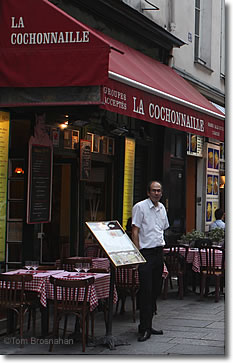 |
Restaurant Etiquette in Paris, France | |
|
Parisian dining is no longer
highly formal, but proper etiquette is still
admired and practiced. You'll dine more happily
if you know the rules.
|
||
|
|
|
In France, a meal is as much a ceremony as it is a necessity. Though the French enjoy food greatly, they also take it seriously, and treat the ceremonies of mealtime with respect. Be formal and polite, and try to do things the French way. The maitre-d' will welcome you to the restaurant and find you a suitable table. Your waiter will be a professional, always polite, always efficient. The chef will be good and careful in his or her work. This is their obligation to you and also their professional pleasure. The part you play in the ceremony is equally important, and it is expected that you will play your part properly. Dinner is a time for polite, quiet conversation. Loud conversations, laughter and exclamations disturb other diners and are not appropriate. Always treat restaurant personnel as professionals, for that's what they are. In France, serving in restaurants and cafés is not a job done by those waiting to find other jobs, it is done as a lifetime career. To summon the waiter, say "Monsieur" (not "Garçon") or "Madamoiselle" or "Madame," or "Excusez-moi," as appropriate. Learn the rules of French dining: —Cocktails (aperitif) are drunk only before dinner, never at the table with a meal. (A glass of champagne or a kir [white wine with a dash of liqueur in it] are favored apéritifs. Wine, beer or water is drunk with your meal.) —Dinner is its own ritual, and a pleasant one it is. More... —Coffee —only café noir (or café express) is drunk, and only after dessert, never with a meal. More... This may not be your preference, but these are the French rules of the ceremony, and if you order coffee at the beginning of lunch or dinner, even in an informal café, it will be brought after the meal anyway. —Tipping is not necessary in French cafés and restaurants. All prices quoted on food and drinks lists, menus and blackboards (ardoise) include all taxes and service charges. This excellent system saves the guest from uncertainty, embarrassment, and having to perform mathematial calculations at the end of a fine evening of food and drink. It also saves the professional staff from uncertainty about earnings and employment benefits. In fact, a tip may be seen as demeaning to a professional waiter. Do not tip!
|
|
Monsieur or Garçon? Get
it right!
|

